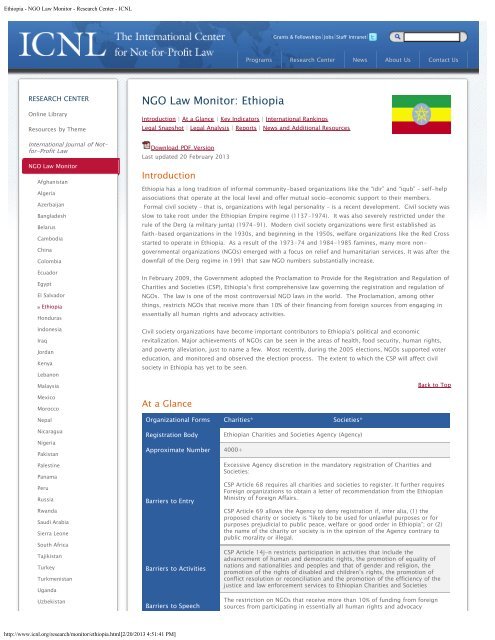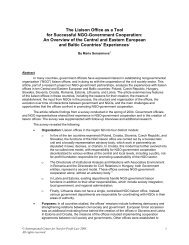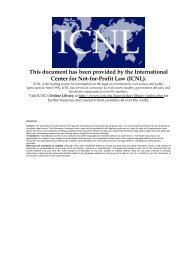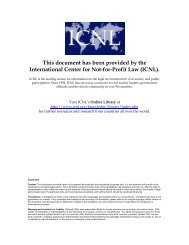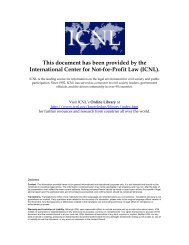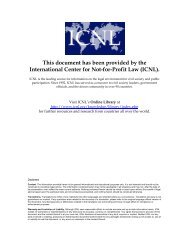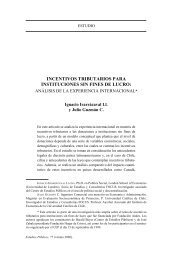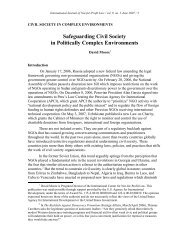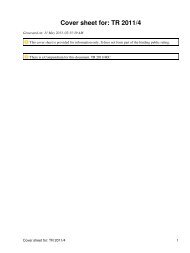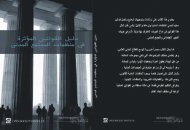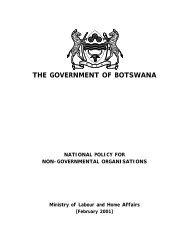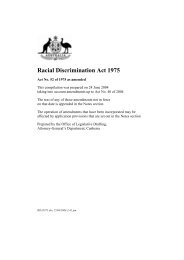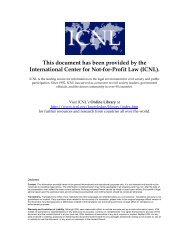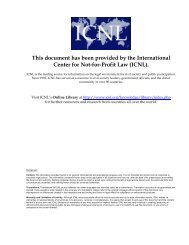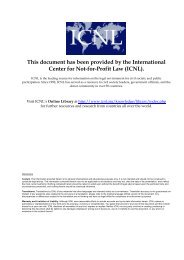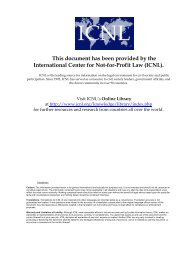Ethiopia - NGO Law Monitor - Research Center - ICNL - The ...
Ethiopia - NGO Law Monitor - Research Center - ICNL - The ...
Ethiopia - NGO Law Monitor - Research Center - ICNL - The ...
You also want an ePaper? Increase the reach of your titles
YUMPU automatically turns print PDFs into web optimized ePapers that Google loves.
<strong>Ethiopia</strong> - <strong>NGO</strong> <strong>Law</strong> <strong>Monitor</strong> - <strong>Research</strong> <strong>Center</strong> - <strong>ICNL</strong>Grants & Fellowships|Jobs|Staff Intranet|Programs <strong>Research</strong> <strong>Center</strong> News About Us Contact UsRESEARCH CENTEROnline LibraryResources by <strong>The</strong>meInternational Journal of Notfor-Profit<strong>Law</strong><strong>NGO</strong> <strong>Law</strong> <strong>Monitor</strong>AfghanistanAlgeriaAzerbaijanBangladeshBelarusCambodiaChinaColombiaEcuadorEgyptEl Salvador<strong>Ethiopia</strong>HondurasIndonesiaIraqJordanKenyaLebanonMalaysiaMexicoMoroccoNepalNicaraguaNigeriaPakistanPalestinePanamaPeruRussiaRwandaSaudi ArabiaSierra LeoneSouth AfricaTajikistanTurkeyTurkmenistanUgandaUzbekistan<strong>NGO</strong> <strong>Law</strong> <strong>Monitor</strong>: <strong>Ethiopia</strong>Introduction | At a Glance | Key Indicators | International RankingsLegal Snapshot | Legal Analysis | Reports | News and Additional ResourcesDownload PDF VersionLast updated 20 February 2013Introduction<strong>Ethiopia</strong> has a long tradition of informal community-based organizations like the “idir” and “iqub” – self-helpassociations that operate at the local level and offer mutual socio-economic support to their members.Formal civil society – that is, organizations with legal personality – is a recent development. Civil society wasslow to take root under the <strong>Ethiopia</strong>n Empire regime (1137-1974). It was also severely restricted under therule of the Derg (a military junta) (1974-91). Modern civil society organizations were first established asfaith-based organizations in the 1930s, and beginning in the 1950s, welfare organizations like the Red Crossstarted to operate in <strong>Ethiopia</strong>. As a result of the 1973-74 and 1984-1985 famines, many more nongovernmentalorganizations (<strong>NGO</strong>s) emerged with a focus on relief and humanitarian services. It was after thedownfall of the Derg regime in 1991 that saw <strong>NGO</strong> numbers substantially increase.In February 2009, the Government adopted the Proclamation to Provide for the Registration and Regulation ofCharities and Societies (CSP), <strong>Ethiopia</strong>’s first comprehensive law governing the registration and regulation of<strong>NGO</strong>s. <strong>The</strong> law is one of the most controversial <strong>NGO</strong> laws in the world. <strong>The</strong> Proclamation, among otherthings, restricts <strong>NGO</strong>s that receive more than 10% of their financing from foreign sources from engaging inessentially all human rights and advocacy activities.Civil society organizations have become important contributors to <strong>Ethiopia</strong>’s political and economicrevitalization. Major achievements of <strong>NGO</strong>s can be seen in the areas of health, food security, human rights,and poverty alleviation, just to name a few. Most recently, during the 2005 elections, <strong>NGO</strong>s supported votereducation, and monitored and observed the election process. <strong>The</strong> extent to which the CSP will affect civilsociety in <strong>Ethiopia</strong> has yet to be seen.At a GlanceOrganizational Forms Charities* Societies*Registration BodyApproximate Number 4000+Barriers to EntryBarriers to ActivitiesBarriers to Speech<strong>Ethiopia</strong>n Charities and Societies Agency (Agency)Excessive Agency discretion in the mandatory registration of Charities andSocieties:Back to TopCSP Article 68 requires all charities and societies to register. It further requiresForeign organizations to obtain a letter of recommendation from the <strong>Ethiopia</strong>nMinistry of Foreign Affairs.CSP Article 69 allows the Agency to deny registration if, inter alia, (1) theproposed charity or society is “likely to be used for unlawful purposes or forpurposes prejudicial to public peace, welfare or good order in <strong>Ethiopia</strong>”; or (2)the name of the charity or society is in the opinion of the Agency contrary topublic morality or illegal.CSP Article 14j-n restricts participation in activities that include theadvancement of human and democratic rights, the promotion of equality ofnations and nationalities and peoples and that of gender and religion, thepromotion of the rights of disabled and children’s rights, the promotion ofconflict resolution or reconciliation and the promotion of the efficiency of thejustice and law enforcement services to <strong>Ethiopia</strong>n Charities and Societies<strong>The</strong> restriction on <strong>NGO</strong>s that receive more than 10% of funding from foreignsources from participating in essentially all human rights and advocacyhttp://www.icnl.org/research/monitor/ethiopia.html[2/20/2013 4:51:41 PM]
<strong>Ethiopia</strong> - <strong>NGO</strong> <strong>Law</strong> <strong>Monitor</strong> - <strong>Research</strong> <strong>Center</strong> - <strong>ICNL</strong>VenezuelaYemenZimbabweAfrican UnionAssociation of SoutheastAsian NationsCouncil of EuropeLeague of Arab StatesOrganization of AmericanStatesOrganization of IslamicCooperationOrganization for Securityand Cooperation in EuropeUnited Nations HumanRights CouncilGlobal Trends in <strong>NGO</strong> <strong>Law</strong>and/or AdvocacyBarriers toInternational ContactBarriers to Resourcesactivities may effectively silence civil society in <strong>Ethiopia</strong> by starving <strong>NGO</strong>s ofresources, and thus essentially extinguishing their right to expression.<strong>The</strong> CSP does not directly restrict International Contact, but the restriction onforeign funding may have a negative effect on International Contact.<strong>The</strong> restrictions on <strong>NGO</strong> resources may force the closures of manyorganizations, especially Human Rights organizations. This is of particularconcern in <strong>Ethiopia</strong> where local sources of financing are very limited and <strong>NGO</strong>sare thus dependent on foreign funding. Alternately, <strong>NGO</strong>s may abandondisfavored missions or activities if they cannot raise funds locally to sustainthem.* Charities are classified as institutions established exclusively for charitable purposes and provides publicbenefit. (Article 14 of CSP) <strong>Ethiopia</strong>n law recognizes four types of charitable organizations: a charitableendowment, charitable institution, charitable trust and charitable society. Societies are classified asassociations or persons organized on non profit making and voluntary basis formation of the rights andinterests of their members and to undertake other similar lawful purposes as well as to coordinate withinstitutions of similar objectives (Article 55 of CSP).Back to TopKey IndicatorsPopulationCapitalType of GovernmentLife Expectancy at Birth88,013,491 (July 2010 est.)Addis AbabaFederal Republic55.8 yearsLiteracy Rate 42.7%Religious GroupsEthnic GroupsGDP per capita<strong>Ethiopia</strong>n Orthodox Christian 40%, Sunni Muslim 45-50%, Protestant 5%,remainder indigenous beliefs.Orthodox 43.5%, Muslim 33.9%, Protestant 18.6%, traditional 2.6%, Catholic0.7%, other 0.7%Oromo 34.5%, Amara 26.9%, Somalie 6.2%, Tigraway 6.1%, Sidama 4%, Guragie2.5%, Welaita 2.3%, Hadiya 1.7%, Affar 1.7%, Gamo 1.5%, Gedeo 1.3%, other11.3%$1,000 (2010 est.)Source: <strong>The</strong> World Factbook 2010. Washington, DC: Central Intelligence Agency, 2010.Back to TopInternational RankingsRanking BodyRankRanking Scale(best – worstpossible)UN Human Development Index 174 (2011) 1 – 169World Bank Rule of <strong>Law</strong> Index 27.5 (2010) 100 – 0World Bank Voice & Accountability Index 11.4 (2010) 100 – 0Transparency International 120 (2011) 1 – 178Freedom House: Freedom in the WorldStatus: Not FreePolitical Rights: 6Civil Liberties: 6Free/Partly Free/NotFree1 – 71 – 7Foreign Policy: Failed States Index 17 (2012) 177 – 1Back to TopLegal SnapshotInternational and Regional Human Rights Agreementshttp://www.icnl.org/research/monitor/ethiopia.html[2/20/2013 4:51:41 PM]
<strong>Ethiopia</strong> - <strong>NGO</strong> <strong>Law</strong> <strong>Monitor</strong> - <strong>Research</strong> <strong>Center</strong> - <strong>ICNL</strong>Key International Agreements Ratification* YearInternational Covenant on Civil and Political Rights (ICCPR) Yes 1993Optional Protocol to ICCPR (ICCPR-OP1) No --International Covenant on Economic, Social, and Cultural Rights (ICESCR) Yes 1993Optional Protocol to ICESCR (OP-ICESCR) No --International Convention on the Elimination of All Forms of RacialDiscrimination (ICERD)Convention on the Elimination of All Forms of Discrimination AgainstWomen (CEDAW)Optional Protocol to the Convention on the Elimination of DiscriminationAgainst Women (OP-CEDAW)Yes 1976Yes 1981No --Convention on the Rights of the Child (CRC) Yes 1991International Convention on the Protection of the Rights of All MigrantWorkers and Members of their Families (ICRMW)No --Convention on the Rights of Persons with Disabilities (CRPD) Yes 2010Regional TreatiesAfrican Charter on Human and People's Rights (ACHPR) Yes 1998African Charter on the Rights and Welfare of the Child Yes 2002Treaty Establishing the African Economic Community Yes 1992* Category includes ratification, accession, or succession to the treatyConstitutional Framework<strong>The</strong> Constitution of the Federal Democratic Republic of <strong>Ethiopia</strong> was adopted in 1994. <strong>Ethiopia</strong> is divided intonine Regional States and two chartered cities run by the federal government. Regional States have legislative,executive and judicial powers. <strong>The</strong> Constitution provides the Regional States with residual power. Thus, allpowers not expressly given to the Federal Government alone or concurrently with the States are reserved forthe States. (Article 52)Relevant constitutional provisions include:Article 29 Right to Hold Opinions, Thoughts and Free Expression(1) Everyone shall have the right to hold opinions without any interference. (2) Everyone shall have theright to freedom of expression without interference. This right shall include freedom to seek, receiveand impart information and ideas of all kinds, regardless of frontiers, either orally, in writing or inprint, in the form of art, or through any media of his choice.Article 30 Freedom of Assembly, Public demonstration and the Right to PetitionEveryone shall have the freedom, in association with others, to peaceably assemble without arms,engage in public demonstration and the right to petition. Appropriate procedure may be enacted toensure that public meetings and demonstrations do not disrupt public activities, or that such meetingsand demonstrations do not violate public morals, peace and democratic rights.Article 31 Right to AssociationEveryone shall have the right to form associations for whatever purpose. Associations formed inviolation of the appropriate laws or associations formed with the objective of overthrowing theconstitutional order or associations carrying out these activities shall be prohibited.National <strong>Law</strong>s and Regulations Affecting SectorRelevant national-level laws and regulations affecting civil society include:Proclamation to Provide for the Registration and Regulation of Charities and Societies(CSP)Commercial Code of <strong>Ethiopia</strong>Income Tax proclamation No 286/2002Value -Added Tax (VAT) proclamation No 285/2002Anti-Terrorism ProclamationPending <strong>NGO</strong> Legislative / Regulatory Initiativeshttp://www.icnl.org/research/monitor/ethiopia.html[2/20/2013 4:51:41 PM]
<strong>Ethiopia</strong> - <strong>NGO</strong> <strong>Law</strong> <strong>Monitor</strong> - <strong>Research</strong> <strong>Center</strong> - <strong>ICNL</strong>We are unaware of any other pending legislative/regulatory initiatives affecting <strong>NGO</strong>s. Please help keep usinformed; if you are aware of pending initiatives, write to <strong>ICNL</strong> at ngomonitor@icnl.orgBack to TopLegal AnalysisOrganizational Forms<strong>The</strong>re are two types of registered, not-for-profit organizations in <strong>Ethiopia</strong>: Charities and Societies.<strong>The</strong>re are four types of Charities recognized by <strong>Ethiopia</strong>n law: charitable endowments, charitable institutions,charitable trusts, and charitable societies. A charitable endowment is an organization through which certainproperty is perpetually and irrevocably designated by donation or will or the order of the agency for apurpose that is solely charitable. (Article 16 of the CSP) A charitable institution is a charity formed by at leastthree persons exclusively for charitable purposes. (Article 27 of the CSP) A charitable trust is anorganization by virtue of which specific property is constituted solely for a charitable purpose to beadministered by persons, the trustees, in accordance with the instructions given by the instrumentconstituting the charitable trust. (Article 30 of the CSP) A charitable society is a society which is establishedfor charitable purposes. (Article 46 of the CSP)Societies are associations or persons organized on a non-profit making and voluntary basis formation of therights and interests of their members and to undertake other similar lawful purposes as well as to coordinatewith institutions of similar objectives. (Article 55 of CSP)Charities and Societies are given one of three legal designations, <strong>Ethiopia</strong>n Charities or Societies, <strong>Ethiopia</strong>nResidentCharities or Societies or Foreign Charities, based on where the organization was established, itssource of income, composition of membership, and membership residential status:<strong>Ethiopia</strong>n Charities or Societies - Charities or Societies formed under the laws of <strong>Ethiopia</strong>, whose membersare all <strong>Ethiopia</strong>ns, generate income from <strong>Ethiopia</strong> and are wholly controlled by <strong>Ethiopia</strong>ns. <strong>The</strong>seorganizations may not receive more than 10% of their resources from foreign sources. (Article 2 of CSP)<strong>Ethiopia</strong>n Resident Charities or Societies – <strong>Ethiopia</strong>n Charities or Societies that receive more than 10% of theirresources from foreign sources. (Article 2 of CSP)Foreign Charities - Charities formed under the laws of foreign countries, or whose membership includesforeigners, or foreigners control the organization, or the organization receives funds from foreign sources.(Article 2 of CSP)Public Benefit StatusBoth Charities and Societies are able to pursue public benefit activities. However, only Societies are permittedto pursue mutual benefit activities as well.While income from grants, donations and membership fees are not subject to tax, Charities and Societiesmust pay tax on other items. Organizations carrying out humanitarian activities are exempt from payingcustom duties on imported items, and organizations that work with international organizations that haveagreements with the <strong>Ethiopia</strong>n government are exempt from paying the VAT in some circumstances.Charities and Societies that engage in income generating activities must pay taxes on earned revenue inaccordance with laws governing organizations involved in activities related to trade, investment or any profitmaking activities. In addition, the Income Tax Proclamation considers donations to Charities and Societies bybusiness organizations or individuals as non-deductible-expenditures.Barriers to Entry<strong>Ethiopia</strong>n law creates barriers to the establishment of charities and societies through mandatory registrationand excessive Agency discretion in the registration process:CSP Article 68 requires all charities and societies to register. It further requires foreign organizations to obtaina letter of recommendation from the <strong>Ethiopia</strong>n Ministry of Foreign Affairs.CSP Article 69 allows the Agency to deny registration if, inter alia, (1) the proposed charity or society is “likelyto be used for unlawful purposes or for purposes prejudicial to public peace, welfare or good order in<strong>Ethiopia</strong>”; or (2) the name of the charity or society is, in the opinion of the Agency, contrary to public moralityor illegal.Barriers to Operational Activityhttp://www.icnl.org/research/monitor/ethiopia.html[2/20/2013 4:51:41 PM]
<strong>Ethiopia</strong> - <strong>NGO</strong> <strong>Law</strong> <strong>Monitor</strong> - <strong>Research</strong> <strong>Center</strong> - <strong>ICNL</strong><strong>The</strong> CSP includes barriers to <strong>NGO</strong>s’ operational activity, in the form of a direct prohibition, and throughinvasive supervisory oversight.First, CSP Article 14j-n restricts participation in activities that include the advancement of human anddemocratic rights, the promotion of equality of nations and nationalities and peoples and that of gender andreligion, the promotion of the rights of disabled and children’s rights, the promotion of conflict resolution orreconciliation, and the promotion of the efficiency of the justice and law enforcement services to <strong>Ethiopia</strong>nCharities and Societies. In other words, charities and societies seeking to pursue these purposes cannotreceive foreign funding that amounts to more than 10% of their overall income.Second, the CSP grants almost unlimited authority to the Agency to supervise charities and societies. Forexample, Section 7 (Articles 84 – 94) gives the Agency virtually unlimited authority to exercise control overthe operations of a charity or society. No procedural protections for the charity or society or its personnelare provided. Among other powers, the Agency may:Institute inquiries about a charity or society without limitation or notice, and for purposes of an inquiry,require a charity or society, or its officers or employees, to produce accounts and statements in writingon any matter at issue in the inquiry, produce documents, and to attend at a specified time or place togive evidence or produce documents (Article 84);Call for a charity or society or its officers or employees to provide orally or in writing “any information”relating to any charity or society, or to produce documents (Article 85);Upon being satisfied that misconduct or mismanagement has occurred and that it is necessary toprotect the property of the charity or society, suspend officers, restrict the organization’s transactionsor the nature or amounts of payments made, or order the retention of property.Third, in November 2011, the <strong>Ethiopia</strong>n Charities and Societies Agency issued the Guideline on Determiningthe Administrative and Operational Costs of CSOs, which is applicable to all charities and societies(international and domestic). Retroactive to July 2011, when approved by the Agency without any consultationwith organizations or donors, the “70/30” regulation limits administrative costs for all charities and societiesto 30% of their budgets. This has caused great concern among charities and societies, as well as amongdonors.Barriers to Speech / AdvocacyBy prohibiting charities and societies that receive more than 10% of their funding from foreign sources fromparticipating in essentially all human rights and advocacy activities, <strong>Ethiopia</strong>n law may effectively silence civilsociety in <strong>Ethiopia</strong> by starving <strong>NGO</strong>s of resources, and thus essentially extinguish their right to expression.Barriers to International Contact<strong>The</strong> CSP does not directly restrict international communication or contact, but the restriction on foreignfunding may have negative implications for international contact.Barriers to ResourcesForeign FundingTo be considered an <strong>Ethiopia</strong>n Charity or Society, an organization may not receive more than 10% of itsoverall resources from foreign sources. (Article 2 of CSP) Only <strong>Ethiopia</strong>n Charities and Societies may engagein activities that advance human and democratic rights; promote the equality of nations and nationalities andpeoples and that of gender and religion; promote the rights of disabled and children’s rights; promoteconflict resolution or reconciliation, and promote the efficiency of the justice and law enforcement services.<strong>The</strong> foreign funding restrictions may force the closure of many organizations, especially human rightsorganizations. This is of particular concern in <strong>Ethiopia</strong> where local sources of financing are limited and <strong>NGO</strong>sare often dependent on foreign funding. Alternately, <strong>NGO</strong>s may abandon disfavored missions or activities ifthey cannot raise funds locally to sustain them.Domestic Funding<strong>The</strong>re are several restrictions relating to domestic funding:Charities and societies are restricted from soliciting money and property that exceeds 50,000 <strong>Ethiopia</strong>nbirr (4000 USD) before registration.Public collection is not allowed unless permitted by the AgencyCharities or societies can only engage in income generating activities that are incidental to theachievement of their purposes.Back to Tophttp://www.icnl.org/research/monitor/ethiopia.html[2/20/2013 4:51:41 PM]
<strong>Ethiopia</strong> - <strong>NGO</strong> <strong>Law</strong> <strong>Monitor</strong> - <strong>Research</strong> <strong>Center</strong> - <strong>ICNL</strong>ReportsUN Universal Periodic Review ReportsReports of UN Special RapporteursUSIG (United States InternationalGrantmaking) Country NotesU.S. State DepartmentFailed States Index ReportsNational ReportCompilation of UN informationSummary of Stakeholders' InformationCIVICUS Submission to the UN Universal Periodic Review:2009SR on the adverse effects of toxic waste and dangerousproducts and human rights. Report E/CN.4/1998/10/Add.<strong>Ethiopia</strong>Not availableAdvancing Freedom and Democracy Report 2010: <strong>Ethiopia</strong>2010 Human Rights Reports: <strong>Ethiopia</strong>2012 Foreign Policy Failed States IndexIMF Country ReportsCIVICUS Civil Society Index (CSI)Country ReportsInternational Commission of JuristsInternational <strong>Center</strong> for Not-for-Profit<strong>Law</strong> Online LibraryInternational Federation for HumanRights (FIDH)<strong>The</strong> Federal Democratic Republic of <strong>Ethiopia</strong>: Selected Issues:Country Report No. 08/259<strong>The</strong> Federal Democratic Republic of <strong>Ethiopia</strong>: Ex PostAssessment of Long-Term Fund Engagement, Country ReportNo. 05/26<strong>Ethiopia</strong>Not availableNot available<strong>Ethiopia</strong>Human Rights Situation in the Federal Democratic Republic of<strong>Ethiopia</strong>: 46th Session of the African Commission on Humanand People's RightsBack to TopNews and Additional ResourcesWhile we aim to maintain information that is as current as possible, we realize that situations can rapidlychange. If you are aware of any additional information or inaccuracies on this page, please keep usinformed; write to <strong>ICNL</strong> at ngomonitor@icnl.org.General News<strong>Ethiopia</strong>’s Prime Minister Hailemariam Desalegn elected by African heads of state as chairman of the AfricanUnion (February 2013)<strong>The</strong> 47-year-old Hailemariam, who became leader of <strong>Ethiopia</strong> after the death from illness of Prime MinisterMeles Zenawi in August, will serve a one-year term as head of the African Union, or AU. <strong>The</strong> 54-membercontinental bloc’s assembly met in <strong>Ethiopia</strong>’s capital, Addis Ababa. <strong>The</strong> AU faces several security challengeson the continent, including rebellions in Mali, eastern Democratic Republic of Congo and the Central AfricanRepublic, and continuing tension between South Sudan and Sudan which have failed to implement agreementson borders.Where is the Humanitarian Requirements Documents for 2013? (February 2013)<strong>Ethiopia</strong> remains one of the world’s least developed countries, ranked 174 out of 187 in the 2011 UNDPHuman Development Index. <strong>The</strong> <strong>Ethiopia</strong>n government often blocks humanitarian food aid and operations anddiverts food aid to feed military forces and militias in the Somali region (Ogaden). Because of the ongoingconflict, military operations, humanitarian crisis humanitarian agencies (UN and <strong>NGO</strong>s) and their staff have noaccess to operate in the Ogaden region. <strong>Ethiopia</strong>’s donors and UN are aware of these problems, but havedone little to address the problems.Cooperatives championed amid <strong>NGO</strong> restrictions (November 2012)As <strong>Ethiopia</strong> imposes increasing restrictions on foreign-backed <strong>NGO</strong>s, cooperatives – which have boosted thecountry’s coffee industry – are being championed as a preferred model for economic development. <strong>NGO</strong>s havebeen active in <strong>Ethiopia</strong> for roughly 40 years, yet the country still ranks in the world’s seventh percentile interms of health, education and living standards, according to the UN Development Programme’s humandevelopment index. This has led to questions about the effectiveness of <strong>NGO</strong>s – especially those that arehttp://www.icnl.org/research/monitor/ethiopia.html[2/20/2013 4:51:41 PM]
<strong>Ethiopia</strong> - <strong>NGO</strong> <strong>Law</strong> <strong>Monitor</strong> - <strong>Research</strong> <strong>Center</strong> - <strong>ICNL</strong>foreign-backed – in creating tangible, long-term progress.<strong>NGO</strong>s call for <strong>Ethiopia</strong>n human rights reform (November 2012)Ahead of the UN Human Rights Council elections, a group of non-governmental organizations (<strong>NGO</strong>s) fromaround the world have jointly urged <strong>Ethiopia</strong>, a standing candidate, to demonstrate its commitment to theprotection and promotion of human rights. <strong>Ethiopia</strong>'s candidature has received some criticism frominternational rights group. Human Rights Watch published letter addressed to <strong>Ethiopia</strong>n prime minister, HaileMariam Desalegne is signed by Asian Forum for Human Rights and Development (FORUM-ASIA), CairoInstitute for Human Rights Studies (CIHRS), CIVICUS: World Alliance for Citizen Participation, East and Horn ofAfrica Human Rights Defenders Project (EHAHRDP), Egyptian Initiative for Personal Rights (EIPR), and HumanRights Watch (HRW). <strong>The</strong> group said that being a candidate state and member to the UN rights council,<strong>Ethiopia</strong> should urgently make reforms to improve human rights conditions in the country.UN labour agency names five countries where ‘serious and urgent’ labour-rights cases need attention(November 2012)A key rights committee of the United Nations labour agency identified five countries where it says workerrightsviolations – some involving murder – represent the “most serious and urgent cases” among 32countries examined at its meeting. Argentina, Cambodia, <strong>Ethiopia</strong>, Fiji and Peru were singled out by theCommittee on Freedom of Association of the UN International Labour Organization (ILO) after Committeemembers reviewed cases involving rights to organize, negotiate through collective bargaining and engage insocial dialogue.German <strong>NGO</strong> pulls out of <strong>Ethiopia</strong> (November 2012)Named after the German Nobel Prize winner for Literature, the Heinrich Böll Foundation is an <strong>NGO</strong> promotingdemocracy and human rights. It is leaving <strong>Ethiopia</strong> in protest against restrictions on its activities." <strong>The</strong> closureof the office in <strong>Ethiopia</strong> is a sign of protest by the foundation against the ongoing restrictions on civil rightsand freedom of speech" said a statement released by the Heinrich Böll Foundation explaining why they hadclosed their office in the <strong>Ethiopia</strong>n capital Addis Ababa.German <strong>NGO</strong> pulls out of <strong>Ethiopia</strong> (November 2012)Named after the German Nobel Prize winner for Literature, the Heinrich Böll Foundation is an <strong>NGO</strong> promotingdemocracy and human rights. It is leaving <strong>Ethiopia</strong> in protest against restrictions on its activities. "<strong>The</strong> closureof the office in <strong>Ethiopia</strong> is a sign of protest by the foundation against the ongoing restrictions on civil rightsand freedom of speech" said a statement released by the Heinrich Böll Foundation explaining why they hadclosed their office in the <strong>Ethiopia</strong>n capital Addis Ababa.Government continues to target peaceful Muslim protest movement(November 2012)<strong>The</strong> <strong>Ethiopia</strong>n authorities are committing human rights violations in response to the ongoing Muslim protestmovement in the country. Large numbers of protestors have been arrested, many of whom remain indetention. <strong>The</strong>re are also numerous reports of police using excessive force against peaceful demonstrators.Key figures within the movement have been charged with terrorism offences. Most of those arrested andcharged appear to have been targeted solely because of their participation in a peaceful protest movement.Joint Letter to <strong>Ethiopia</strong> on its Candidacy to the UN Human Rights Council (November 2012)We, the undersigned, are a diverse group of nongovernmental organizations (<strong>NGO</strong>s) from around the world.With elections to the United Nations Human Rights Council quickly approaching, and with <strong>Ethiopia</strong> standing asa candidate, we are writing to urge your government to demonstrate its commitment to the protection andpromotion of human rights.Joint letter to PM Desalegn requesting removal of arbitrary restrictions on the rights to freedom of expressionand association in <strong>Ethiopia</strong> (October 2012)"As you assume the Premiership of <strong>Ethiopia</strong>, we, the undersigned organisations and individuals, would like totake the opportunity to raise with you a number of issues which we urge you to address as a matter ofpriority. We believe that you now have the opportunity to set a new standard of responsible and accountableleadership and to usher in a new era of promotion of human rights and respect for the rule of law."Why Europe should speak out about <strong>Ethiopia</strong>’s human rights (September 2012)On July 25th, the European Union adopted its strategic framework on human rights and democracy andappointed Stavros Lambrinidis its first special representative for human rights, seeking to “enhance theeffectiveness and visibility of EU human rights policy”. It is now time to translate policy into action. <strong>Ethiopia</strong> isa prime example, with its deteriorating human rights record. <strong>The</strong> recent passing of former Prime MinisterMeles Zenawi, whose leadership was characterized by cracking down on dissidents and dismantling theindependent media, provides the EU with an excellent opportunity to change its policy on <strong>Ethiopia</strong>, argues arecent article on <strong>Ethiopia</strong> and EU human rights policy.After Meles: what next for US aid in <strong>Ethiopia</strong>? (August 2012)http://www.icnl.org/research/monitor/ethiopia.html[2/20/2013 4:51:41 PM]
<strong>Ethiopia</strong> - <strong>NGO</strong> <strong>Law</strong> <strong>Monitor</strong> - <strong>Research</strong> <strong>Center</strong> - <strong>ICNL</strong><strong>The</strong> death of <strong>Ethiopia</strong>n Prime Minister Meles Zenawi raises fresh questions about the future of US aid to thecountry and the conundrum of providing aid in countries whose leaders hang on to power at the expense ofdemocracy, writes the <strong>Center</strong> for Global Development. Could a new rule banning foreign aid to long-servingheads of state help?Bahrain and UN Human Rights Council (August 2012)UN Special Rapporteur Maina Kiai and other human rights experts call for Najeeb Rajab's release in Bahrain.“It is time for the Bahraini authorities to comply with the rights to peaceful assembly and expression andimmediately release those arbitrarily detained for exercising their legitimate freedoms,” a group of UnitedNations human rights experts has said. <strong>The</strong>y are calling for the prompt release of prominent human rightsdefender Nabeel Rajab, who was recently sentenced to three years imprisonment. Mr. Rajab was convicted onthree charges of illegal assembly related to his participation in peaceful gatherings in favour of fundamentalfreedoms and democracy, including a peaceful protest to denounce the detention of fellow human rightsdefender Abdulhadi Al Khawaja. <strong>The</strong> Special Rapporteur on freedom of peaceful assembly and of association,Maina Kiai, stressed that “the exercise of the right to freedom of peaceful assembly should not be subject toprior authorization from the authorities.” For the rights expert, “the criminalization of people participating inpeaceful assemblies for the sole reason that they did not seek the approval of the authorities to hold suchassemblies contradicts international human rights law.”<strong>The</strong> passing of Meles Zenawi (August 2012)<strong>The</strong> death of Meles Zenawi, <strong>Ethiopia</strong>’s prime minister, on August 20th reveals much about the country hehelped build up economically. In 1991, after the fall of the last leader, Mengistu Haile Mariam, the 36-yearoldMr. Meles took power, becoming Africa’s youngest leader. He had moral authority as a survivor offamines. Western governments and publics, who became aware of <strong>Ethiopia</strong>n hunger through the Band Aid andLive Aid charity concerts, gave willingly. Mr. Meles often dictated the terms under which donors could operatein <strong>Ethiopia</strong> and turned his country into Africa’s biggest aid recipient.EU praises Meles Zenawi (August 2012)<strong>The</strong> EU Commission president highlighted the contribution to development made by the controversial longtimeleader of <strong>Ethiopia</strong>, who died on August 20. José Manuel Barroso expressed “great sadness” at news ofthe death of Meles Zenawi, praising <strong>Ethiopia</strong>'s long-time leader for improving living conditions in <strong>Ethiopia</strong> andfor his leadership in Africa.CSOs concerned about African Human Rights Council candidates (July 2012)CSOs working to promote human rights at the UN Human Rights Council have expressed concern at therecent decision of the African Group to endorse the candidacies of <strong>Ethiopia</strong> and Sudan in the upcoming UNGeneral Assembly elections for membership of the Human Rights Council in a closed slate that does not allowfor a competitive vote.Climate of intimidation against rights defenders and journalists (July 2012)UN High Commissioner for Human Rights Navi Pillay said she is seriously alarmed about the current climateof intimidation against human rights defenders and journalists in <strong>Ethiopia</strong> resulting from the use of “overlybroad” laws on terrorism and civil society registration. “<strong>The</strong> recent sentencing of 20 <strong>Ethiopia</strong>ns, includingprominent blogger Eskinder Nega, journalists and opposition figures under vague anti-terrorism law hasbrought into stark focus the precarious situation of journalists, human rights defenders and governmentcritics in the country,” Pillay said.International community must act against latest curbs on free speech in <strong>Ethiopia</strong> (July 2012)Recent moves to curb freedom of expression in <strong>Ethiopia</strong> represent a steep escalation in an ongoing campaignto silence dissent, says global civil society network CIVICUS: World Alliance for Citizen Participation.Lessons on dealing with the Charities and Societies Proclamation (May 2012)In six years of implementation, a total of 56 grant contracts have been awarded and more than 400 CivilSociety Organisations (CSOs) have benefited from the capacity development activities provided by the CivilSociety Fund in all regions of <strong>Ethiopia</strong>. <strong>The</strong> project portfolio shows a rich diversity in interventions withprojects ranging from providing support to women and children facing abuse, campaigning for holisticwomen’s empowerment to popularising alternative dispute resolution, capacitating local courts and mitigatingand preventing conflict in multi-ethnic regions. <strong>The</strong> head of the EU delegation said, “<strong>The</strong> main challenge wasthat we are operating in an environment where there is a law called the Charities and Societies Proclamation,which is, in a way, restrictive in the sense that it limits the possibility of <strong>NGO</strong>s that receive foreign funding tooperate in the advocacy or governance field.” He added, “Most importantly we have managed to keep adialogue open and ongoing with government authorities. We are talking to them about a number of issuesrelated to governance and human rights. We are talking about the modalities of implementation of theCharities and Societies Proclamation… and we are in a situation where we can discuss that with thegovernment because we have done things transparently.”http://www.icnl.org/research/monitor/ethiopia.html[2/20/2013 4:51:41 PM]
<strong>Ethiopia</strong> - <strong>NGO</strong> <strong>Law</strong> <strong>Monitor</strong> - <strong>Research</strong> <strong>Center</strong> - <strong>ICNL</strong>Amnesty International report highlights Charities and Societies Proclamation's stranglehold on <strong>NGO</strong>s(March2012)<strong>The</strong> report noted the "devastating impact" the Proclamation is having on <strong>NGO</strong>s in <strong>Ethiopia</strong>, some of which haveseen their assets frozen and their offices closed. <strong>The</strong> law requires charities to spend no more than 30 percentof their money on administration and restricts criticism of the <strong>Ethiopia</strong>n government. According to the report,the Proclamation has been used by the government to freeze financial assets of more than Us$1 millionbelonging to the country's two leading human rights organizations.<strong>Ethiopia</strong>'s human rights record poses awkward questions for its aid donors (February 2012)UN human rights experts have expressed their dismay at what they see as the continuing abuse of antiterrorismlegislation to curb freedom of expression in <strong>Ethiopia</strong>. <strong>The</strong> blunt criticism from the UN may not beso easy to shrug off by a regime usually impervious to foreign criticism. It recently brusquely dismissed aHuman Rights Watch that accused the government of forcibly relocating thousands of people in the Gambellaregion.Future of last remaining human rights monitoring <strong>NGO</strong> in the balance (February 2012)On February 3, 2012, the Cassation Bench of the Federal Supreme Court of <strong>Ethiopia</strong> will hear a petition by theHuman Rights Council (HRCO), <strong>Ethiopia</strong>'s oldest human rights organization, to admit an appeal against thefreezing of its bank accounts. Amnesty International, ARTICLE 19, CIVICUS, East and Horn of Africa HumanRights Defenders Project and Human Rights Watch express deep concern at the obstacles and restrictions towhich HRCO and other human rights organizations in <strong>Ethiopia</strong> are now subjected, as illustrated by this case.<strong>The</strong> decision of the Supreme Court will be of great significance for the future of HRCO's vital work and for thewider promotion and protection of human rights in <strong>Ethiopia</strong>.UN experts disturbed at persistent misuse of terrorism law to curb freedom of expression (February 2012)A number of UN human rights experts on Thursday expressed their dismay at the continuing abuse of antiterrorismlegislation to curb freedom of expression in <strong>Ethiopia</strong>. A week ago, three journalists and twoopposition politicians* were given prison sentences ranging from 14 years to life imprisonment under<strong>Ethiopia</strong>'s anti-terrorism laws. This follows the sentencing of two Swedish journalists to 11 years in prison on27 December 2011. Another 24 defendants are scheduled to appear before the court on 5 March 2012, forvarious charges under the anti-terrorism law, several of whom may face the death sentence if convicted.News archiveA decision by the Federal High Court undermines the survival of prominent national human rightsorganisation (November 2011)Violence against women on the rise (September 2011)Britain and EU increase aid to <strong>Ethiopia</strong> while ignoring human rights warnings (August 2011)Terrorism law undercuts free speech (July 2011)<strong>Ethiopia</strong> violates its own Constitution, <strong>Law</strong>s – US State Department report (April 2011)EU Parliament hearing on Development Aid and Human Rights (March 2011)<strong>Ethiopia</strong>n Charities & Societies Agency shuts down organizations (February 2011)<strong>The</strong> <strong>Ethiopia</strong>n Charities and Societies Agency board upholds revocation of <strong>NGO</strong>s’ licenses, and the freezing ofaccounts (February 2011)Four <strong>NGO</strong>s get government ban (February 2011)Human Rights Watch: <strong>Ethiopia</strong> uses Aid to Bribe Voters (October 2010)Back to Top<strong>The</strong> foregoing information was collected by the <strong>ICNL</strong> <strong>NGO</strong> <strong>Law</strong> <strong>Monitor</strong> partner organization in <strong>Ethiopia</strong>.© 2012 International <strong>Center</strong> for Not-for-Profit <strong>Law</strong> (<strong>ICNL</strong>) Site Map | Privacy Policy / Terms of Usehttp://www.icnl.org/research/monitor/ethiopia.html[2/20/2013 4:51:41 PM]


